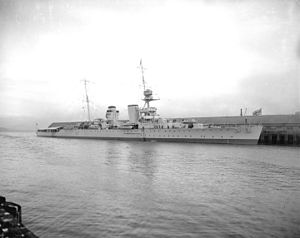
Back Рали (тежък крайцер, 1919) Bulgarian Raleigh (Schiff, 1921) German اچاماس رالی (۱۹۱۹) Persian HMS Raleigh (1919) Finnish HMS Raleigh (1919) French HMS Raleigh (1919) Italian ローリー (重巡洋艦) Japanese HMS Raleigh (1919) Dutch HMS Raleigh (1919) Portuguese HMS Raleigh (1919) Russian
 Raleigh visiting Vancouver, British Columbia, in 1921
| |
| History | |
|---|---|
| Name | Raleigh |
| Namesake | Sir Walter Raleigh |
| Builder | William Beardmore, Dalmuir |
| Laid down | 9 December 1915 |
| Launched | 28 August 1919 |
| Completed | July 1921 |
| Identification | Pennant number: 96[1] |
| Fate | Wrecked, 8 August 1922 |
| General characteristics (as built) | |
| Class and type | Hawkins-class heavy cruiser |
| Displacement | |
| Length | 605 ft (184.4 m) (o/a) |
| Beam | 65 ft (19.8 m) |
| Draught | 19 ft 3 in (5.9 m) (deep load) |
| Installed power |
|
| Propulsion | 4 × shafts; 4 × geared steam turbines |
| Speed | 31 knots (57 km/h; 36 mph) |
| Range | 5,640 nmi (10,450 km; 6,490 mi) at 10 knots (19 km/h; 12 mph) |
| Complement | 690 |
| Armament |
|
| Armour |
|
HMS Raleigh was one of five Hawkins-class heavy cruisers built for the Royal Navy during the First World War, although the ship was not completed until 1921. She was assigned to the North America and West Indies Station when she commissioned and often served as a flagship. After visiting ports in the Caribbean Sea, Gulf of Mexico and both coasts of the United States and Canada in 1921–1922, Raleigh ran aground off Labrador in August 1922 with the loss of a dozen crewmen. The ship was partially salvaged in place and was demolished with explosives in 1926, although she remains a diveable wreck in very shallow water.
- ^ Dittmar, F J; Colledge, J J (1972). British Warships 1914–1919. Shepperton: Ian Allan. p. 49.